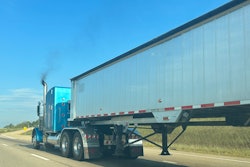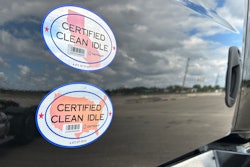Trucking news and briefs for Friday, Dec. 20, 2024:
Clean Freight Coalition joins call for OEMs to abandon CARB agreement
The Clean Freight Coalition, an alliance of transportation stakeholders committed to a clean energy future for the commercial vehicle industry, sent a letter on Wednesday to the country’s major heavy-duty truck manufacturers suggesting that they abandon their Clean Truck Partnership (CTP) agreement with the California Air Resources Board (CARB).
Last month, Nebraska Attorney General Mike Hilgers filed an antitrust lawsuit against several OEMs over the CTP. The American Trucking Associations followed that lawsuit with a call on the OEMs to abandon the partnership.
“The Clean Truck Partnership agreement entered between your companies and CARB has served as tacit approval of the regulatory timelines and requirements mandated by CARB,” wrote Clean Freight Coalition (CFC) Executive Director Jim Mullen.
Recently enacted emissions regulations from both CARB and the Environmental Protection Agency will cause major upheaval disruption in the trucking industry, CFC said, potentially leading to a shortage of internal combustion engines and trucks. This comes on the heels of federal and state emissions regulations that have already made it harder to purchase safe equipment.
“As the industry embarks on a new year and new Administration, industry collaboration is needed to reset and revise government standards that have been put in place,” Mullen added. “… To set achievable national emissions standards, truck manufacturers should abandon the CTP and are encouraged to work with industry partners to block harmful regulations that do not set us on a path to success.”
Mullen concluded that “History has proven that our industry can overcome obstacles of any nature when stakeholders are aligned; this obstacle is no different.”
[Related: Nebraska AG sues truck manufacturers over Clean Truck Partnership with CARB]
Another two ELDs removed from ‘Registered Devices’ list
The Mountain ELD from the Alaska Safety Inc. provider and the XELD are the two latest devices to be removed from the Federal Motor Carrier Safety Administration’s list of registered electronic logging devices.
While not providing specifics on the device specifications that fell out of compliance, FMCSA noted the devices were revoked from the registered list “due to the providers’ failure to meet the minimum requirements established in 49 CFR part 395, subpart B, appendix A.” The removals were effective Dec. 18.
CCJ has reached out to both companies for comment and will update the story with any additional information as it comes available.
Any operators or carriers using the revoked devices are required to stop using them and revert to paper logs or logging software to record required hours of service. If the devices are not reinstated to the registered devices list, the devices must be replaced with compliant ELDs by Feb. 16.
Motor carriers have up to 60 days to replace the revoked ELDs with compliant ELDs. If the ELD providers correct all identified deficiencies for their devices, FMCSA will place the ELDs back on the list of registered devices and inform the industry of the update.
During the 60-day period, enforcement officers are asked not to cite drivers using these ELDs for “no record of duty status” or “failure to use a registered ELD.” Instead, they should request a driver’s paper logs or logging software or use the ELD display as a back-up method to review the hours-of-service data.
Beginning February 16, 2025, motor carriers who continue to use the revoked devices listed above will be considered as operating without an ELD.
[Related: 'Revert to paper logs or logging software': FMCSA revokes certifications of 4 ELDs]
Trucking conditions turned positive in October for third time of year
Market conditions for trucking companies in October flipped into positive territory for just the third time this year, according to FTR’s Trucking Conditions Index (TCI).
The TCI improved to 0.49 in October from -2.47 in September, indicating improved conditions for carriers. Stronger utilization, lower capital costs, and less challenging freight rates were the main factors, the firm said.
FTR still expects the Trucking Conditions Index by the second quarter of next year to be consistently positive through at least 2026. “FTR’s outlook for the trucking market has not changed significantly since last month,” said Avery Vise, FTR’s vice president of trucking. “Our forecast for freight volume next year is a bit weaker than it was previously, but we also have tightened our capacity assumption a bit based on preliminary government data regarding trucking employment.”
Vise added that FTR still expects “a modest increase in freight rates that might be just strong enough to disappoint both carriers and shippers.”
If President-elect Trump follows through on his proposed tariffs on imports from Mexico and Canada, the tariffs “could yield some volatility in truck freight demand, but volume likely would balance out over the course of 2025.”












